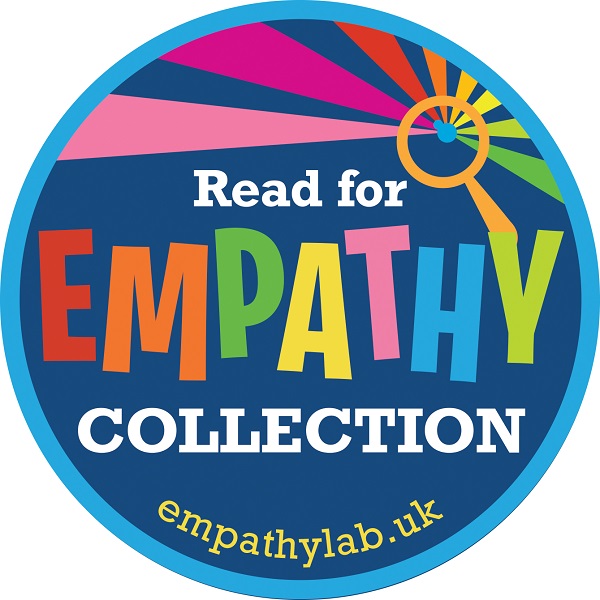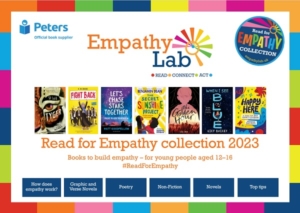
2023 Read for Empathy collection – an introduction from the librarian judges
Empathy is a skill that can be learnt and the 2023 Read for Empathy collection aims to focus that learning through superb books in order to build a kinder future. The collection is compiled every year by EmpathyLab and a team of twelve judges from libraries, schools and the book world. Here, four of the judges – all librarians – write about the collection.
Young people are affected by so many complex and confusing developments, with the cost-of-living crisis coming hot on the heels of the pandemic, and troubling world issues like war. Reading can help, especially empathy-focused reading.
Connection and community are key to young people’s wellbeing and the 65 books in the Read for Empathy collection are each chosen for their unique contribution to building young people’s empathy awareness and skills.
The Read for Empathy books are all great reads in their own right, but as a collection they can be used by parents, teachers and librarians in in a focused drive to instil empathy values and support profound insights into other lives and experiences.
The Judging Process
From as early as March 2022 books submitted by the publishers started arriving at home. We had to convince our families we hadn’t spent yet more money on books, but were reading and reviewing to assess for empathy!. After time for much reading , difficult decisions had to be made in a series of meetings to flesh out which books might best build young people’s empathy awareness and skills in today’s strange world.
Shaheen reports that, ‘As a new judge on the Empathy Lab team, I did not anticipate the number of books that would be nominated by publishers. Fortunately, my years of reading had prepared me for this moment and, with my speedy reading glasses on, I got to work!. The judging criteria for the collection focused our attention on the empathy elements of the book as well as the overall quality. Our aim was to create a collection that reflects the needs of our children and communities which could be used by casual readers as well as professionals. The judges wide and varied experience allowed us to explore the books in depth and choose those which powerfully tackle key empathy issues.’
The judges are guided by criteria honed by EmpathyLab using a combination of scientific research, and learning from practical work in communities. For instance, judges are asked to look for:
- Expertly crafted characters which readers care about. This is because neuroscience research shows that reading feels vividly real, and identifying with the emotions of book characters helps us build real-life understanding of other people.
- books which challenge the tribal thinking we humans slip so easily into; which explore themes about building understanding between individuals and communities
- Books which can support the development of key empathy skills, especially perspective- taking. The annual collections often feature books in which the characters have different points of view.
- Books which tackle key empathy issues of the day such as refugees or homelessness, and provide insights into other challenging life circumstance like mental illness or disability
The primary collection for 3–11 year-olds consists of 40 books.
A special new section has seven picture books focusing on understanding and sharing one’s emotions, a key aspect of empathy. The River by Tom Percival and Sometimes I’m a baby bear, sometimes I’m a snail by Moira Butterfield and Gwen Millward explore how feelings can rapidly change, and offer strategies to recognise this is normal.
Other books from the primary collection to look out for are:
- Has anyone seen Archie Ebbs? by Simon Packham, which explores society’s obsession with status and money and how, when people become poor, they can become invisible.
- Frankie’s World by Aoife Dooley is a graphic novel about a neurodiverse character, written by a neurodiverse author. An authentic tale of searching for answers and learning that it’s ok to be confident in who you are.
- Our Tower by Joseph Coelho and Richard Johnson is just one of the collection’s exquisitely illustrated picture books. It explores the importance of our environment and the people in it and what they mean to us.
The secondary collection features 25 books for 12-16 year-olds.
Several explore parental illness and bereavement. The Dream House by Laura Dockrill is gentle, very observant and sensitively written. A  young man has lost his father and as he tries to heal, experiences universal feelings of grief, sadness and guilt.
young man has lost his father and as he tries to heal, experiences universal feelings of grief, sadness and guilt.
Our sister, again by Sophie Cameron tells the story of a family broken by the death of a daughter and sister who is brought back to life through Artificial Intelligence. A gripping, original story which thought-provokingly asks what makes us human.
When our worlds collided by Danielle Jawando is one of several novels in the collection which support the building of perspective-taking skills. It’s told by three characters with a range of perspectives allowing us to build a deep insight into their experiences from different angles. It examines prejudice focused on race, class and gender. Unfortunately, this will be the experience of too many children.
Jane Mitchell’s heartfelt latest novel Run for Your Life tells the story of a young Muslim girl who refuses to acquiesce to an arranged marriage. She and her mother escape the wrath of a vengeful father who has beaten an older daughter almost to death – shockingly, with village support.
The plight of refugees is told with great empathy in Sita Brahmachari’s novel When Shadows Fall – a powerful story about the environment, family break down, mental illness, refugees and gang violence.
The collection also features novels addressing the painfully topical issues of poverty and the environment, and ones which help the reader empathise with people experiencing a range of health conditions.
In our post-Covid and divided world, the need for empathy is more important than ever. The carefully curated 2023 Read for Empathy collection encourages compassion, connection and community. We’re proud to put these books into the hands of young people. They highlight empathy as a beacon of hope in what can seem a dark and confusing world.
Sarah Mears, MBE FCLIP, Programme Manager, Libraries Connected
Shaheen Mogradia, Engagement and Programmes Assistant, Bolton Libraries
Sarah Smith, BEM, Libraries Development Manager, Brent
Dawn Woods, Member Development Librarian, School Library Association
For further information, training is available: https://www.empathylab.uk/our-foundation-empathy-programme
A School Library Association seminar is taking place 3:30 – 4:30 Monday 27th February: free for SLA members an online seminar exploring the newly launched 2023 #ReadforEmpathy book collection. Book here.






